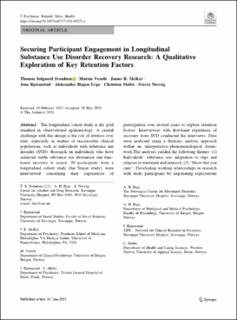| dc.contributor.author | Svendsen, Thomas Solgaard | |
| dc.contributor.author | Veseth, Marius | |
| dc.contributor.author | McKay, James R. | |
| dc.contributor.author | Bjornestad, Jone | |
| dc.contributor.author | Erga, Aleksander Hagen | |
| dc.contributor.author | Moltu, Christian | |
| dc.contributor.author | Nesvåg, Sverre | |
| dc.date.accessioned | 2021-08-17T11:42:08Z | |
| dc.date.available | 2021-08-17T11:42:08Z | |
| dc.date.created | 2021-07-05T14:52:48Z | |
| dc.date.issued | 2021 | |
| dc.identifier.issn | 2198-9834 | |
| dc.identifier.uri | https://hdl.handle.net/11250/2768841 | |
| dc.description.abstract | The longitudinal cohort study is the gold standard in observational epidemiology. A central challenge with this design is the risk of attrition over time, especially in studies of inaccessible clinical populations, such as individuals with substance use disorder (SUD). Research on individuals who have achieved stable substance use abstinence and functional recovery is scarce. 30 participants from a longitudinal cohort study (the Stayer study), were interviewed concerning their experiences of participation over several years to explore retention factors. Interviewers with first-hand experience of recovery from SUD conducted the interviews. Data were analyzed using a thematic analytic approach within an interpretative–phenomenological framework. The analyses yielded the following themes: (1) Individuals’ substance use: adaptation to slips and relapses in treatment and research, (2) “Show that you care”: Developing working relationships in research with study participants by negotiating expectations flexibly, and (3) “You don’t just make dropouts”: A long-term focus on study participation and treatment can increase retention. Several factors were perceived as relevant to participation in a long-term follow-up study with diverse recovery routes, including working research relationships and explicit contracts allowing follow-up participation, even during periods of drug use. Longitudinal studies could benefit from including such factors in the tracking procedures in addition to more traditional tracking techniques. Clinical services could benefit from developing interventions that use knowledge of long-term recovery processes as non-linear, heterogeneous trajectories, and proactive approaches to motivate recovery. | en_US |
| dc.language.iso | eng | en_US |
| dc.publisher | Springer | en_US |
| dc.rights | Navngivelse 4.0 Internasjonal | * |
| dc.rights.uri | http://creativecommons.org/licenses/by/4.0/deed.no | * |
| dc.title | Securing Participant Engagement in Longitudinal Substance Use Disorder Recovery Research: A Qualitative Exploration of Key Retention Factors | en_US |
| dc.type | Journal article | en_US |
| dc.type | Peer reviewed | en_US |
| dc.description.version | publishedVersion | en_US |
| dc.rights.holder | Copyright 2021 The Authors | en_US |
| cristin.ispublished | true | |
| cristin.fulltext | original | |
| cristin.qualitycode | 1 | |
| dc.identifier.doi | 10.1007/s40737-021-00222-y | |
| dc.identifier.cristin | 1920338 | |
| dc.source.journal | Journal of Psychosocial Rehabilitation and Mental Health | en_US |
| dc.identifier.citation | Journal of Psychosocial Rehabilitation and Mental Health. 2021 | en_US |

